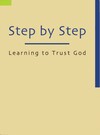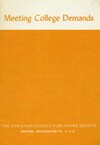

Are you sure?
This bookmark will be removed from all folders and any saved notes will be permanently removed.
The Possibilities of Intelligence
Intelligence is generally considered a private possession, sometimes inherited, sometimes cultivated through education and use, but always dependent upon the brain for normality. Intelligence has been described by mankind as the mental function of comprehending connections, as the cognition that accumulates knowledge, and as the ability to use proper means for accomplishing objectives. The word implies mental acuteness, the ability to reason, and the capacity to grasp facts and judge values.
Christian Science lifts the meaning of intelligence to great heights. It rejects the assumption that intelligence is a private possession or that it is dependent upon brain and declares it to be an attribute of God, apart from matter, which man, God's incorporeal image, reflects. According to Science, intelligence is not broken into bits but is indivisible and infinite. Its possibilities are available to everyone through the demonstration of the truth that man is God's likeness.
In "Science and Health with Key to the Scriptures," Mary Baker Eddy gives this definition as part of her scientific answer to the question, "What is intelligence," (p. 469): "It is the primal and eternal quality of infinite Mind, of the triune Principle,— Life, Truth, and Love,—named God."
Enjoy 1 free Sentinel article or audio program each month, including content from 1898 to today.
JSH Collections
This article is included in:
2010 - ANTHOLOGY
Step by step: learning to trust God
This article is included in:
1967 - PAMPHLET
Meeting college demands
JSH-Online has hundreds of pamphlets, anthologies, and special editions for you to discover.

August 28, 1965 issue
View Issue-
Eternal and Temporal Science
NEIL KENSINGTON ADAM
-
Motivation for College Writing
RITA RIGGIN SWAN
-
"WHEN I CONSIDER THY HEAVENS..."
Margery Todahl Blokhine
-
Expressing Godlike Qualities
RALPH H. WATTINGER
-
"Seek ye first the kingdom of God"
VIRGINIA P. ONDERDONK
-
Physiology or Spirit?
JEAN WHITEHEAD
-
A College Student Writes
JEANNE COLETTE LA BERCE
-
The Possibilities of Intelligence
Helen Wood Bauman
-
The Rebellion Against Absolutes
William Milford Correll
-
A LIBRARIAN'S PRAYER
Bonny Norman Gregory
-
In my experience problems of...
Bruce Lloyd Warrell
-
I first heard of Christian Science...
Freda M. Coles
-
"Ye shall know the truth, and...
Grace M. Froome with contributions from Edward Froome
-
When I was about twelve years...
Blanche C. Pollock
-
It has been a great blessing to...
Eric Morgan
-
For many years I have enjoyed...
Jane Gibson Casterline Krueger
-
Signs of the Times
with contributions from W. Carl Thomas, Mary S. Carey



